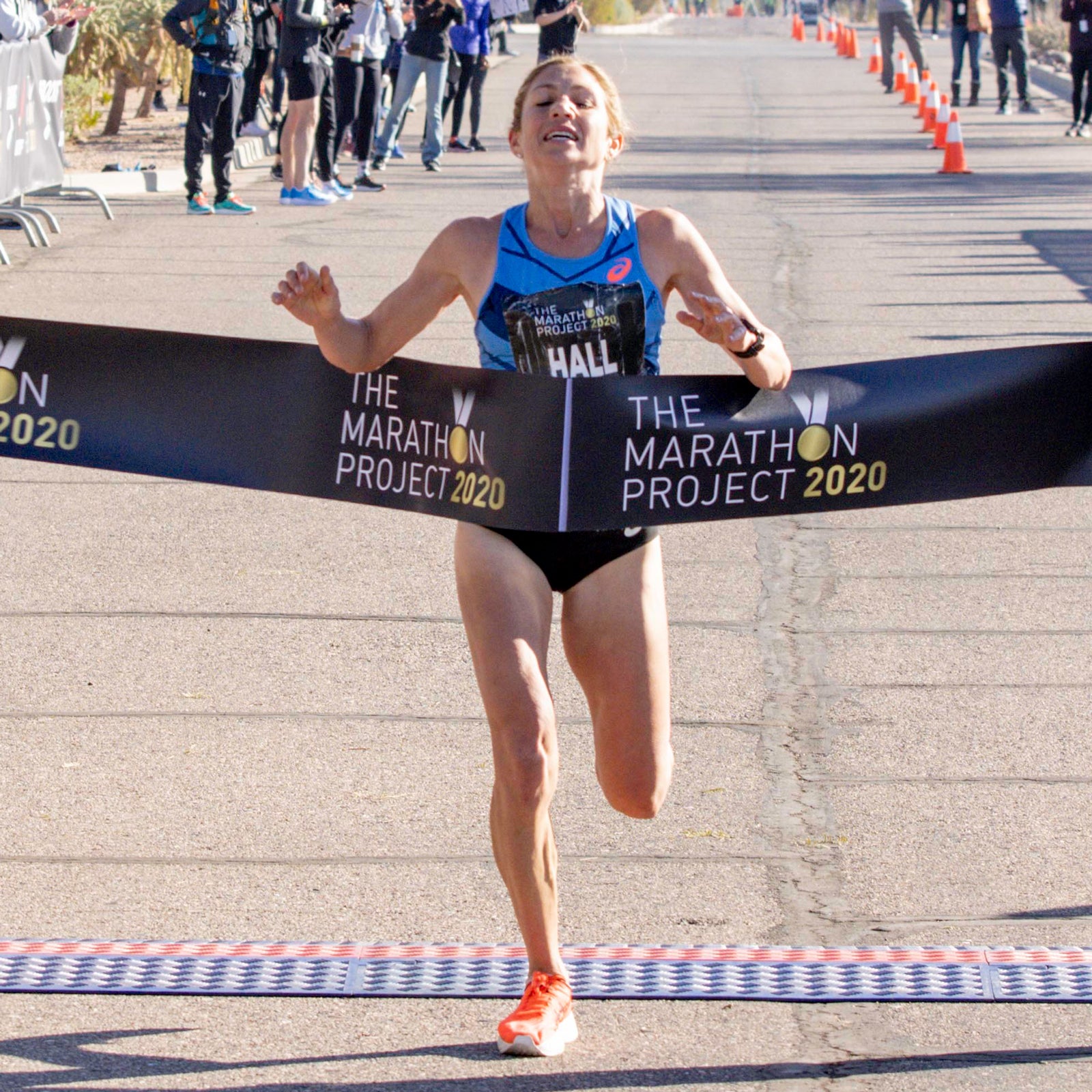In an otherwise meager year for distance running, the purpose of The Marathon Project, which took place yesterday on the outskirts of Chandler, Arizona, was to give some of the fastest American marathoners (and a few international competitors) an opportunity to rip on a flat course before the onset of what promises to be a very long winter.
And rip they did. Even though none of the podium finishers from last February’s U.S. Olympic Trials took part in the race, there were some all-time performances in the Arizona desert. The 37-year-old Sara Hall—who was 33 before she first broke 2:30, in her fourth attempt at 26.2 miles—continued her late-career brilliance by winning the women’s race in 2:20:32. It was the second-fastest time ever run by an American woman. At the halfway mark, Hall was on pace to break Deena Kastor’s record of 2:19:36, which has stood since 2006. Though she faded slightly in the second half of the race, Hall still ran fast enough to prove her gamble was worth it.
On the men’s side, Khalid Khannouchi’s U.S. record of 2:05:38 (set in 2002) was never in play, but for the first time ever seven American runners cracked the magical 2:10 barrier in the same race. The winner, 28-year-old med student Martin “Marty” Hehir even snuck under 2:09, breaking the tape in 2:08:59. For Hehir, it was a two-and-a-half-minute improvement on his previous PR, set at the Trials, where he finished sixth, despite having to make a pit stop. (“It’s amazing what you can do when not stopping for a mid-race poop,” after his win on Sunday. Words to live by.)
When the men’s lead pack began to splinter in the final miles, Noah Droddy managed to maintain contact, more or less, with Hehir until the finish. He crossed the line in second place and celebrated his massive personal best of 2:09:09 with a geyser of lime green vomit. While Droddy’s race clearly ended not a moment too soon, women’s runner up Keira D’Amato still had enough to kick to the line for an 11-minute PR of 2:22:56—a fitting end to a year in which she, at age 36, ran personal bests in every major distance from the 5K to the marathon. Colin Bennie (2:09:38) and Kellyn Taylor (2:25:22) each finished in third to round out the podium spots.
Of course, everything about The Marathon Project was engineered for maximum speed: the ideal climate, the flat terrain, the perfectly calibrated pacing. Such optimization made Sunday’s fast times feel a little preordained and—at least for sourpusses like me who resent such hybrid time trial/races—anticlimactic. Despite the bevy of newly minted members of the sub-2:10 club, these performances didn’t deliver the same oomph factor that we got at the 2019 Boston Marathon, when Jared Ward and Scott Fauble broke the barrier in an unpaced, championships-style event on a pedigreed course. (Fauble, by the way, finished fourth on Sunday and was the only sub-2:10 man on the day who had been to the promised land before.)
But nobody is allowed to complain about getting to watch a professional marathon in 2020. Especially a marathon which, from a pure racing standpoint, was thrilling until the end, with almost ten men still in contention for the win with four miles to go. At the point, Hehir threw in a surge and broke apart the pack, but he never quite had it in the bag until he crossed the line.
Things were a little more clear cut on the women’s side. (Taylor went with Hall through halfway, and set an unofficial half marathon PR by doing so, but her pace dropped off dramatically after that and Hall had nobody to challenge her.) While I’m making enemies, I might as well confess that I was secretly hoping that Hall would come up just short of breaking Kastor’s illustrious record from 2006. It’s nothing personal. But I would prefer to see Hall break the record in a race where she actually has to compete for the win (or for place), instead of just latching onto two (male) pacers and holding on for as long as possible. To be fair, that is more or less , but it came in the context of a race where her victory was hardly a forgone conclusion from the start.
So far, Kastor and Kannouchi’s American records have survived, even in the era of super shoes. It may only be a matter of time, but wouldn’t it be miraculous if the next great marathon record happened by virtue of competitive necessity, rather than by design?


